Reflection in Biology
Reflection in biology refers to the process by which an individual carefully considers their own actions, attitudes, and behaviors. This self-examination is critical for personal and professional development, and it is an essential skill for anyone pursuing a career in the field of biology.
Why is Reflection Important in Biology?
Reflection is important in biology for several reasons:
- Self-awareness: Reflection helps individuals become more self-aware, allowing them to recognize their strengths and weaknesses as biologists.
- Learning from experiences: By reflecting on their experiences, biologists can identify what worked well and what could be improved, leading to continuous learning and growth.
- Critical thinking: Reflective practice encourages biologists to think critically about their work, leading to better problem-solving and decision-making skills.
- Professional development: Through reflection, biologists can set goals for their professional development and take steps to achieve them.
How to Reflect in Biology
Reflecting in biology involves the following steps:
- Set aside time: Find a quiet and comfortable space to reflect without distractions.
- Review experiences: Think about recent experiences in the field, lab, or classroom and consider what you learned from them.
- Ask questions: Ask yourself questions such as "What went well?", "What could have been done differently?", and "What did I learn from this experience?"
- Write it down: Keep a reflection journal to record your thoughts, insights, and action plans.
- Seek feedback: Discuss your reflections with mentors, professors, or peers to gain different perspectives.
Study Guide for Reflection in Biology
To study and practice reflection in biology, follow these steps:
- Read about the importance of reflection in the field of biology.
- Reflect on your recent experiences in the biology lab, fieldwork, or classroom.
- Write a reflective essay discussing what you have learned from your experiences and how you can apply that knowledge in the future.
- Discuss your reflective essay with a biology teacher or mentor and seek feedback.
- Set aside regular time for reflection in your study schedule to develop this critical skill.
By following this study guide, you can improve your ability to reflect critically and thoughtfully, leading to personal and professional growth in the field of biology.
.◂Biology Worksheets and Study Guides High School. Introduction to animals
Worksheet/Answer key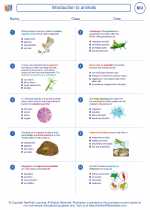 Introduction to animals
Introduction to animals  Worksheet/Answer key
Worksheet/Answer key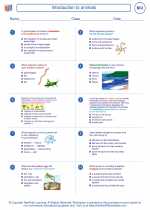 Introduction to animals
Introduction to animals  Worksheet/Answer key
Worksheet/Answer key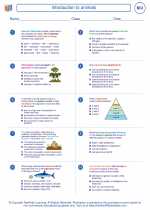 Introduction to animals
Introduction to animals  Worksheet/Answer key
Worksheet/Answer key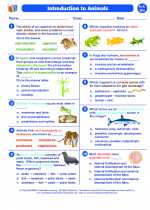 Introduction to animals
Introduction to animals  Vocabulary/Answer key
Vocabulary/Answer key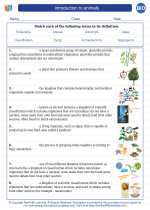 Introduction to animals
Introduction to animals  Vocabulary/Answer key
Vocabulary/Answer key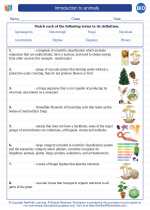 Introduction to animals
Introduction to animals  Vocabulary/Answer key
Vocabulary/Answer key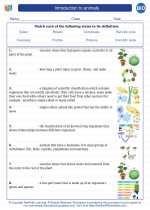 Introduction to animals
Introduction to animals 

 Worksheet/Answer key
Worksheet/Answer key
 Worksheet/Answer key
Worksheet/Answer key
 Worksheet/Answer key
Worksheet/Answer key
 Vocabulary/Answer key
Vocabulary/Answer key
 Vocabulary/Answer key
Vocabulary/Answer key
 Vocabulary/Answer key
Vocabulary/Answer key

The resources above cover the following skills:
Concepts of Life Science (SC1, SC2, SC3)
The student demonstrates an understanding of the structure, function, behavior, development, life cycles, and diversity of living organisms by describing the structure-function relationship